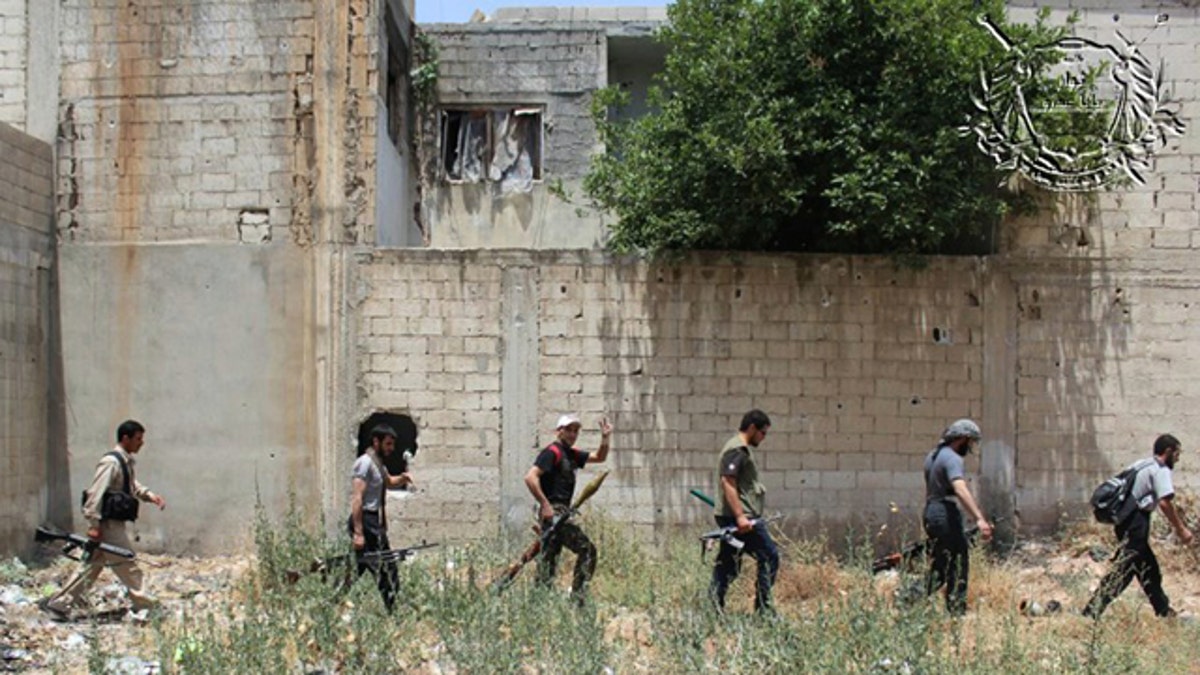
FILE-This file photo released on Monday, June 18, 2012 by the anti-government activist group Rebels Battalion of Baba Amro, which has been authenticated based on its contents and other AP reporting, shows Syrian rebels holding their weapons as they prepare to fight against Syrian troops, in Homs province, Syria. (AP Photo/Rebels Battalion of Baba Amro, File)
BEIRUT – Hundreds of Syrian rebels on Wednesday began evacuating their last bastions in the central city of Homs under a ceasefire deal struck last week with government forces, opposition activists and the city's governor said.
The exit of some 1,200 fighters from rebel strongholds in Homs will mark a de-facto end of the rebellion in the battered city, which was one of the first places to rise up against President Bashar Assad's rule, earning its nickname as "the capital of the revolution."
Around mid-morning Wednesday, dozens of fighters boarded five buses that arrived at the police command on the edge of the rebel-held areas ahead of the evacuation, opposition activists said. Afterward, two of the buses left the city, heading north.
An activist who goes by the name of Abu Yassin al-Homsi said all fighters and any remaining civilians were expected to leave the city during the day, adding that they would be taken a few kilometers (miles) north to the rebel held towns of Talbiseh and al-Dar al-Kabira on the northern edge of Homs province -- a short drive away.
Later, al-Homsi confirmed later that the first group of fighters that evacuated the city center "arrived safely" in rebel-held areas north of the province. Each fighter was allowed to carry his rifle and a bag of belongings with him. One rocket propelled grenade launcher and a machinegun were also allowed on each bus, he said.
"We are very sad for what is happening today. We kept urging the international community to lift the siege but there was no response," al-Homsi said. "We have lost more than 2,000 martyrs in nearly two years of siege."
Homs governor Talal Barazi also confirmed that the rebels have started leaving the old districts of Homs.
It was a bitter moment for the exhausted rebels, who have been holed up in the historic quarters of Homs where they had pledged to fight till the end. Some fighters had said they would rather die than give up Homs.
Isolated and battered after months of bombardment and blockades that caused widespread hunger, they agreed last Friday to a cease-fire deal that would allow hundreds of fighters to evacuate from 13 neighborhoods around the city's historic center where they had barricaded themselves.
The rebels include hardcore fighters from the al-Qaida-linked Nusra Front group and other Islamic factions.
Their exit hands over to Assad's forces a strategic but largely destroyed city ahead of presidential elections scheduled to be held on June 3. Once the evacuation is completed, the government will have control of all but one area of Homs, the rebel-held Waer district just outside the Old City. Some activists said negotiations were underway for a similar deal there.
Homs, Syria's third largest city located in the central western plains, was among the first to rise up against Assad in early 2011 with waves of exuberant anti-Assad protests.
It quickly came under a series of crushing government offensives, turning into a battleground that left entire blocks and much of its historic quarters in ruins. Thousands of people were killed and almost all its residents fled.
For well over a year, the government forces have been besieging rebels in the string of districts they held in the city center, around its ancient bazaars. The siege caused severe shortages in food and medicine.
Earlier this year, around 1,400 people, including fighters who surrendered, were evacuated from the city in a U.N.-mediated operation.
Homs has also seen the ever-increasing religious dimension of the conflict, with tit-for-tat sectarian killings in the city where majority Sunni Muslims once lived alongside Christians and Alawites.
Most recently, on April 7, a masked gunman killed a beloved, elderly Dutch priest who lived in a monastery in a Homs rebel-held district after deciding to stay alongside civilians who were unable to leave.
While the agreement represents a demoralizing admission of defeat by opposition forces, it can also be seen as a face-saving deal for both sides.
Weakened rebels, for whom Homs' collapse was only a matter of time, get a safe exit, while the government can save manpower and weapons and claim it was able to retake the last rebel bastions without spilling more blood.
In exchange for their evacuation, activists say opposition fighters will allow aid into two northern pro-government villages, Nubul and Zahra, besieged by the rebels.
Director of the London-based Syrian Observatory for Human Rights, Rami Abdurrahman, said roads to Nubul and Zahra in northern Syrian were opened as the evacuations from Homs started on Wednesday, apparently to allow the flow of aid.
As part of the Homs deal, rebels would also release up to 70 pro-government gunmen and an Iranian woman they hold captive in the northern city of Aleppo, several activists said.
It was not immediately clear whether they had been released.
